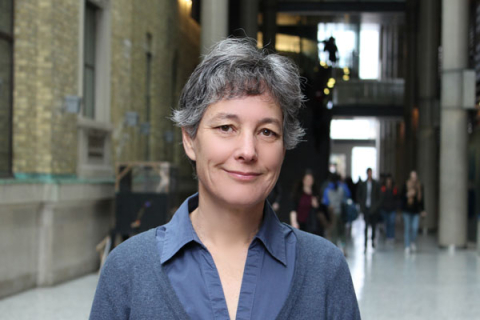Association of Environmental Engineering and Science Professors Distinguished Lecture

IIHR—Hydroscience and Engineering is hosting the Association of Environmental Engineering and Science Professors Distinguished Lecture, Professor Elizabeth Edwards. Known for her work on anaerobic bioremediation, the lecture is titled, "The Complex Microbiology of Pilot and Full-Scale Anaerobic Digestion Systems." Dr. Edwards will describe her anaerobic digestion research that seeks to understand how to efficiently and effectively use microbiological data to reimagine waste disposal. Participants can join in-person or by Zoom.
Anaerobic digestion (AD) is an effective process for converting organic material into methane and carbon dioxide. AD is the result of a beautifully intricate and complex interactive microbial ecosystem. Inexpensive sequencing technology has enabled unprecedented exploration of these ecosystems uncovering thousands of new microbes and putative genes. Yet how can we extract meaningful and actionable data from these microbiological data? We have investigated solid-state anaerobic digestion (SS-AD) as a viable alternative for organic waste disposal, particularly in North America where tipping fees are low because it minimizes the costs of waste pretreatment, mixing, and subsequent wastewater treatment. We have operated a laboratory SS-AD digester affectionately called "Daisy" for several years. Daisy comprises six 10L leach beds and is fed a mixture of cardboard, boxboard, newsprint, fine paper, and varying amounts of food waste. The addition of food waste results in enhanced fiber conversion, but is this enhanced conversion explained by microbial community composition? We have also investigated full-scale AD systems treating pulp and paper mill waste streams and tracked the associated microbial communities. These data reveal the importance of time with respect to adaptation of the microbial community and response to perturbations. Appreciating microbial community dynamics, and in particular different process and metabolic time constants will contribute to improved AD operation.
Professor Elizabeth Edwards holds Bachelor's and Master's degrees in Chemical Engineering from McGill University, Montreal, and a PhD degree (1993) in Civil and Environmental Engineering from Stanford University. She is known for her work on anaerobic bioremediation, the application of molecular biology and metagenomics to uncover novel microbial processes, and the transition of laboratory research into commercial practice to develop bioremediation and bioaugmentation strategies for groundwater pollutants.
Individuals with disabilities are encouraged to attend all University of Iowa–sponsored events. If you are a person with a disability who requires a reasonable accommodation in order to participate in this program, please contact Craig Just in advance at (319)335-5051 or craig-just@uiowa.edu